Shri Nimbarka: The Devotee of Radha-Krishna
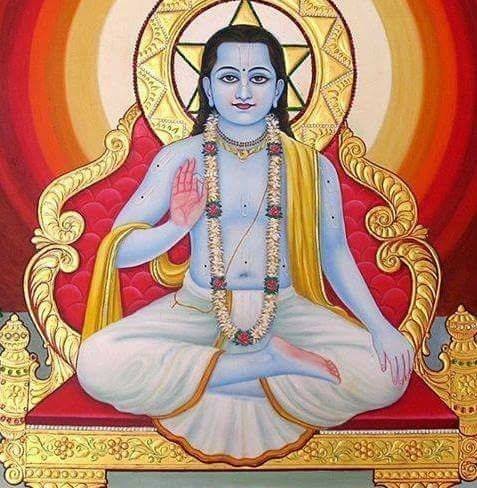
Nimbarka, also known as Nimbarkacharya, was a Hindu philosopher and theologian who founded the Nimbarka Sampradaya, a tradition within Vaishnavism. He is best known for his teachings on the dualistic-non-dualistic philosophy called Dvaitadvaita. Nimbarka’s devotion to Radha and Krishna and his unique philosophical contributions have left a lasting impact on Hinduism.
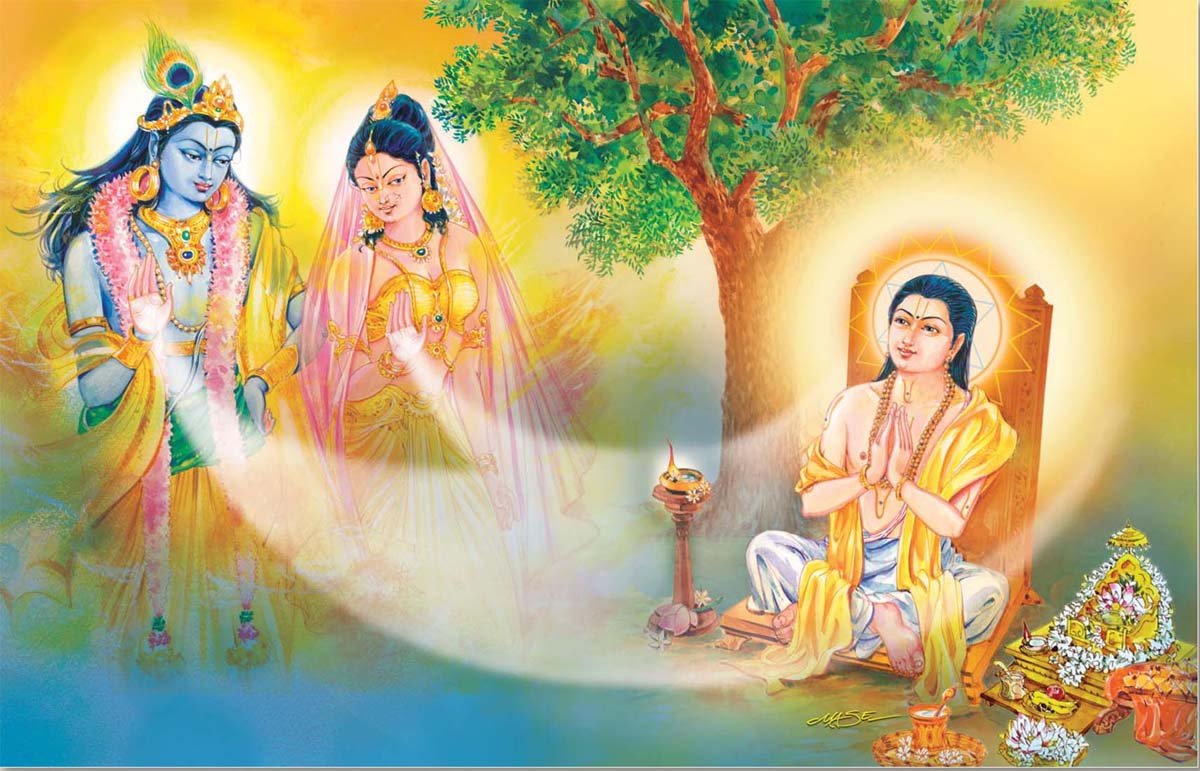
Nimbarka was born in the 11th or 12th century in a Telugu Brahmin family in South India. His parents, Aruni and Jayanti, were devout followers of Hindu traditions. Nimbarka spent most of his life in Mathura, Uttar Pradesh, a place deeply associated with the worship of Krishna. There is some debate about the exact dates of his life, with some sources suggesting he lived as early as the 7th century; his teachings were influenced by earlier Vedantic traditions, but he developed his own unique perspective. He is sometimes confused with another philosopher named Bhaskara, but their teachings are distinct.
Nimbarka’s primary achievement was the establishment of the Nimbarka Sampradaya. This tradition emphasises the worship of Radha and Krishna as the supreme deities. Nimbarka’s philosophy, Dvaitadvaita, or dualistic-non-dualistic, teaches that the soul (jiva) and the material world (jagat) are both distinct from and dependent on God (Isvara). This means that while the soul and the world are different from God, they cannot exist independently of Him. Nimbarka wrote several important texts, including the “Vedanta Parijata Saurabha,” a commentary on the Brahma Sutras, and the “Dashashloki,” ten verses that summarise his philosophical views². His teachings have been preserved and propagated by his disciples, ensuring that his legacy continues to influence Hindu thought.
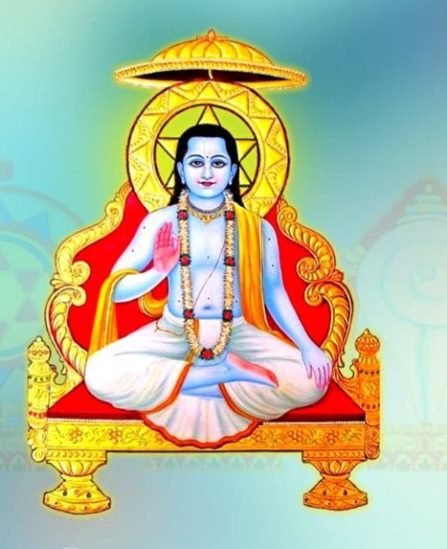
Nimbarka’s contributions to Hindu philosophy and devotion are significant. His teachings on the dualistic-non-dualistic nature of reality and his devotion to Radha and Krishna have inspired countless followers. The Nimbarka Sampradaya remains an important tradition within Vaishnavism, continuing to spread Nimbarka’s message of devotion and philosophical inquiry. His life and teachings remind us of the rich diversity within Hinduism and the enduring power of devotion and philosophical exploration. His legacy continues to inspire and guide those who seek a deeper understanding of the divine.
Dvaitadvaita, or dualistic non-dualism, is a unique philosophical system proposed by Nimbarka. Here are the key principles:
Simultaneous Difference and Non-Difference: The core idea of Dvaitadvaita is that the soul (jiva) and the universe (jagat) are both distinct from and dependent on God (Brahman). This means that while the soul and the universe are different from God, they cannot exist independently of Him.
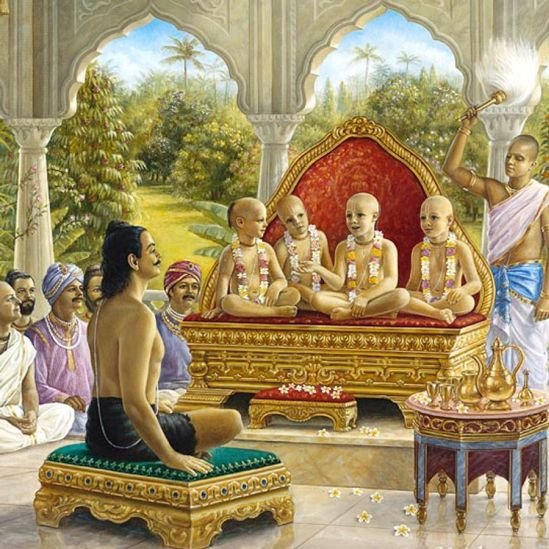
Dynamic Interrelation: The relationship between God, the soul, and the universe is dynamic and interdependent. The soul is eternally individual, conscious, and free, yet it is also dependent on Brahman for its existence. The universe, in all its material aspects, is an expression of Brahman’s creative power.
Role of Devotion (Bhakti): Devotion is central to Dvaitadvaita. Through devotion, one can experience the non-duality aspect of Brahman, realising the oneness with the ultimate reality while also appreciating the individuality of one’s soul. Bhakti is the means through which the soul can understand and experience its relationship with Brahman.
Practical Implications of Devotion: This philosophy prescribes a way of life centred around loving service to God and recognizing the divine presence within all beings. This leads to a more compassionate and empathetic approach to life.
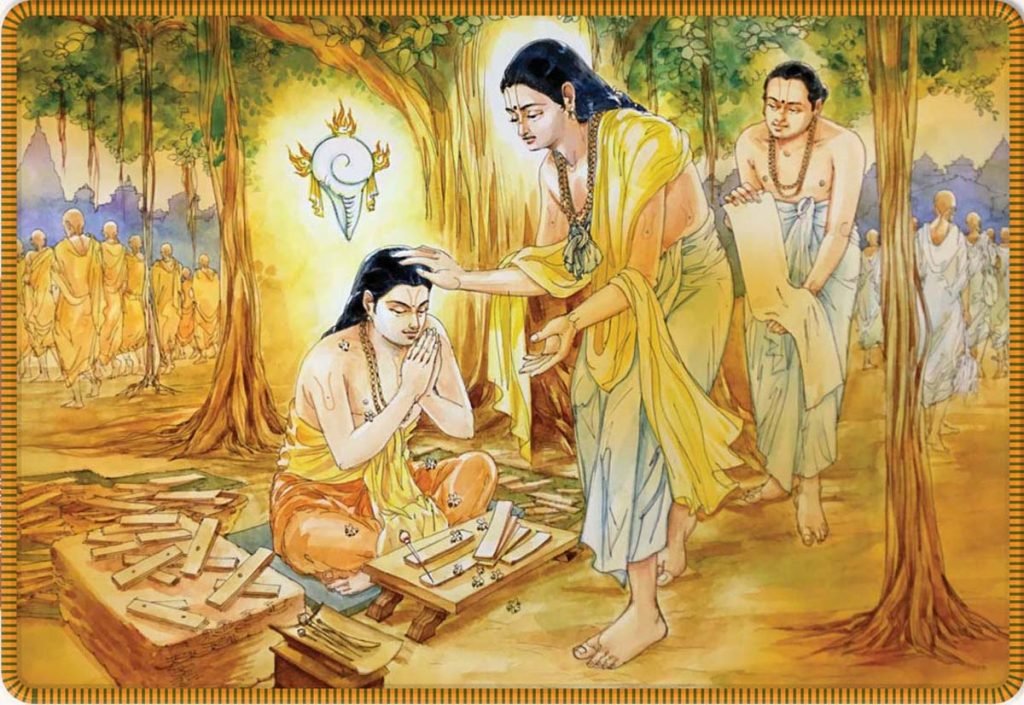
Dvaitadvaita and Advaita Vedanta are two distinct philosophical systems within Hinduism, each offering unique perspectives on the nature of reality and the relationship between the individual soul and the ultimate reality, Brahman. Here are the key differences:
Dvaitadvaita (Dualistic Non-Dualism):
Simultaneous Difference and Non-Difference: Nimbarka’s Dvaitadvaita posits that the soul (jiva) and the universe (jagat) are both distinct from and dependent on God (Brahman). This means that while the soul and the universe are different from God, they cannot exist independently of Him.
Dynamic Interrelation: The relationship between God, the soul, and the universe is dynamic and interdependent. The soul is eternally individual, conscious, and free, yet it is also dependent on Brahman for its existence.
Role of Devotion (Bhakti): Devotion is central to Dvaitadvaita. Through devotion, one can experience the non-duality aspect of Brahman, realizing the oneness with the ultimate reality while also appreciating the individuality of one’s soul.
Advaita Vedanta (Non-Dualism):
Absolute Non-Dualism: Adi Shankara’s Advaita Vedanta teaches that Brahman is the only reality, and the individual soul (Atman) is not different from Brahman. The perceived differences between the soul, the universe, and Brahman are due to ignorance (avidya).
Illusory Nature of the World: According to Advaita, the world and individual experiences are illusory (maya). The ultimate goal is to realise the non-dual nature of Brahman and transcend the illusion of separateness.
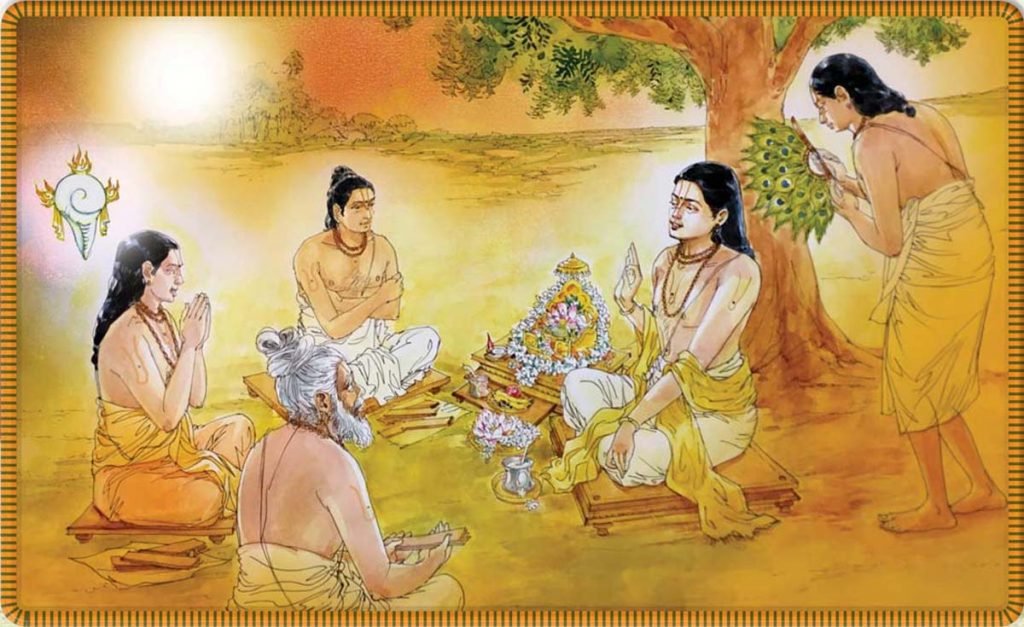
Path of Knowledge (Jnana): The primary means to achieve liberation (moksha) in Advaita is through self-inquiry and knowledge (jnana). By understanding the true nature of the self as Brahman, one can overcome ignorance and realise oneness with the ultimate reality.
Dvaitadvaita:
Devotional Practices: Emphasises loving devotion and service to God, particularly Radha and Krishna. Devotees engage in rituals, chanting, and other forms of worship to cultivate a personal relationship with the divine.
Ethical Living: Encourages a compassionate and empathetic approach to life, recognizing the divine presence within all beings.
Meditative Practices: Focuses on meditation, self-inquiry, and contemplation to realise the non-dual nature of the self and Brahman.
Detachment: Advocates for detachment from worldly desires and attachments, seeing them as obstacles to realising the true nature of the self.
While both Dvaitadvaita and Advaita Vedanta aim for the liberation of the soul, they offer different paths and perspectives. Dvaitadvaita emphasises a balanced approach of devotion and wisdom, recognizing both the distinctness and dependence of the soul on God. Advaita Vedanta, on the other hand, focuses on the realisation of the non-dual nature of Brahman and the illusory nature of the world.
These differences highlight the rich diversity within Hindu philosophical thought, providing various paths for individuals to explore and understand their relationship with the divine.
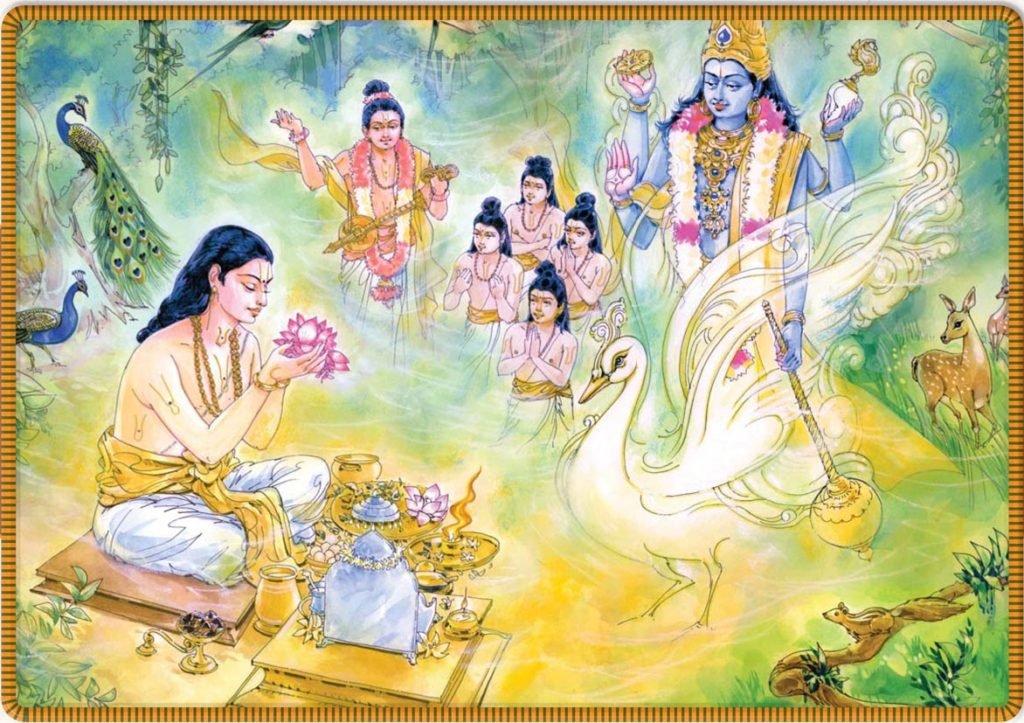
His teachings place a strong emphasis on devotion to Radha and Krishna. This focus on bhakti has influenced many modern Hindu practices and movements. The Nimbarka Sampradaya, which he founded, continues to promote devotional worship, rituals, and festivals centred around Radha-Krishna. This tradition has contributed to the broader bhakti movement, which emphasises personal devotion to a deity as a path to spiritual liberation. Nimbarkacharya’s Dvaitadvaita philosophy offers a unique perspective that balances dualism and non-dualism. This has enriched the diversity of Vedantic thought within Hinduism. His ideas provide an alternative to the more widely known Advaita Vedanta of Adi Shankara, offering devotees a different path to understanding the relationship between the soul, the universe, and God. The Nimbarka Sampradaya has influenced various cultural and religious practices in regions where it is prominent, such as Mathura and Vrindavan. These areas are known for their vibrant celebrations of Radha-Krishna, including festivals like Holi and Janmashtami. The teachings of Nimbarkacharya have helped shape the devotional culture in these regions, emphasising the importance of love and devotion in daily life.
His philosophy promotes a sense of unity and harmony by acknowledging both the distinctness and interconnectedness of all beings with the divine. This perspective fosters a more inclusive and compassionate approach to interfaith dialogue and understanding. By recognizing the divine presence in all, his teachings encourage respect and empathy towards people of different faiths and beliefs.
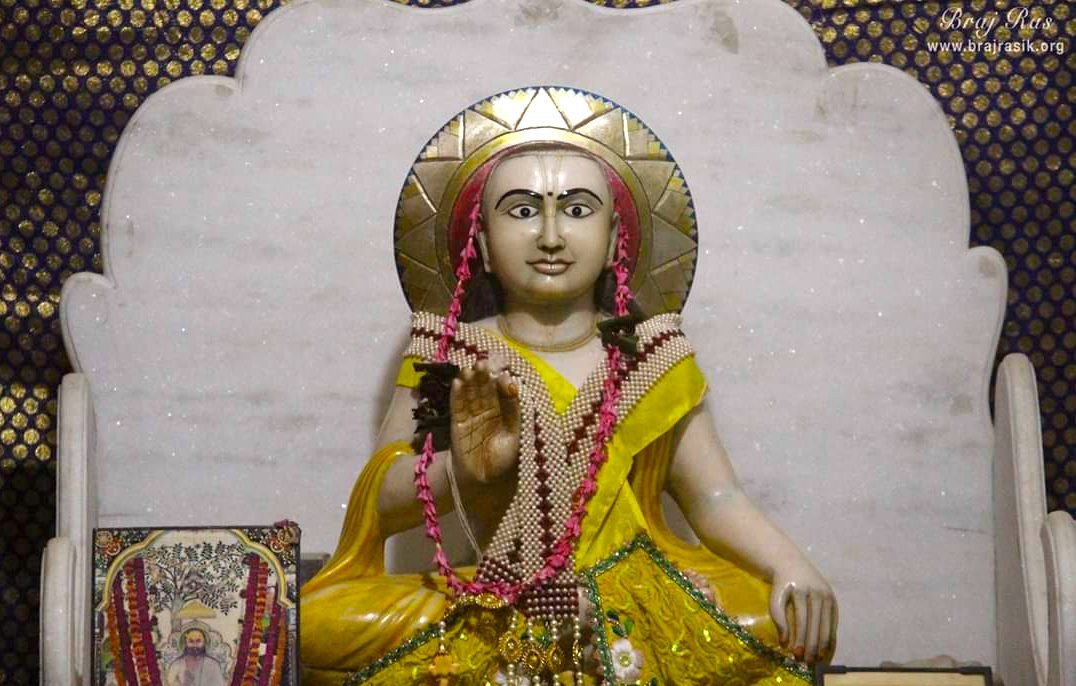
Several modern spiritual movements and organisations draw inspiration from Nimbarkacharya’s teachings. These movements continue to spread his message of devotion and philosophical inquiry, adapting his principles to contemporary contexts. This ensures that his legacy remains relevant and accessible to new generations of seekers.
Nimbarkacharya’s influence on modern Hinduism is profound and multifaceted. His emphasis on devotion, unique philosophical contributions, and impact on cultural practices have left an indelible mark on the Hindu tradition. By promoting a balanced understanding of dualism and non-dualism, his teachings continue to inspire and guide devotees in their spiritual journeys.
Shrinivasa’s sub-commentary, known as the Vedanta Kaustubha, is an important work that elaborates on Nimbarka’s commentary on the Brahma Sutras, called the Vedanta Parijata Saurabha. Here are some key aspects of Shrinivasa’s sub-commentary:
Shrinivasa’s Vedanta Kaustubha provides detailed explanations and clarifications of Nimbarka’s interpretations of the Brahma Sutras. It helps to elucidate the complex philosophical concepts presented by Nimbarka, making them more accessible to scholars and practitioners.
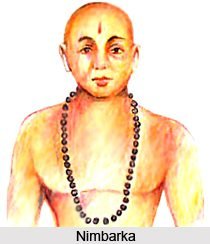
One of the significant contributions of Shrinivasa’s work is the reconciliation of various Vedantic views. The Vedanta Kaustubha compares Nimbarka’s interpretations with those of other prominent Vedantic philosophers, such as Shankara (Advaita Vedanta), Ramanuja (Vishishtadvaita), and others. This comparative approach helps to highlight the unique aspects of Nimbarka’s Dvaitadvaita philosophy.
The Vedanta Kaustubha delves deeply into the metaphysical and epistemological aspects of Nimbarka’s teachings. It discusses the nature of reality, the relationship between the individual soul (jiva) and the supreme soul (Brahman), and the role of knowledge and devotion in achieving liberation (moksha) ; also his sub-commentary has played a crucial role in preserving and propagating Nimbarka’s teachings. It has been a valuable resource for subsequent generations of scholars and devotees, ensuring that Nimbarka’s philosophical contributions continue to be studied and appreciated.
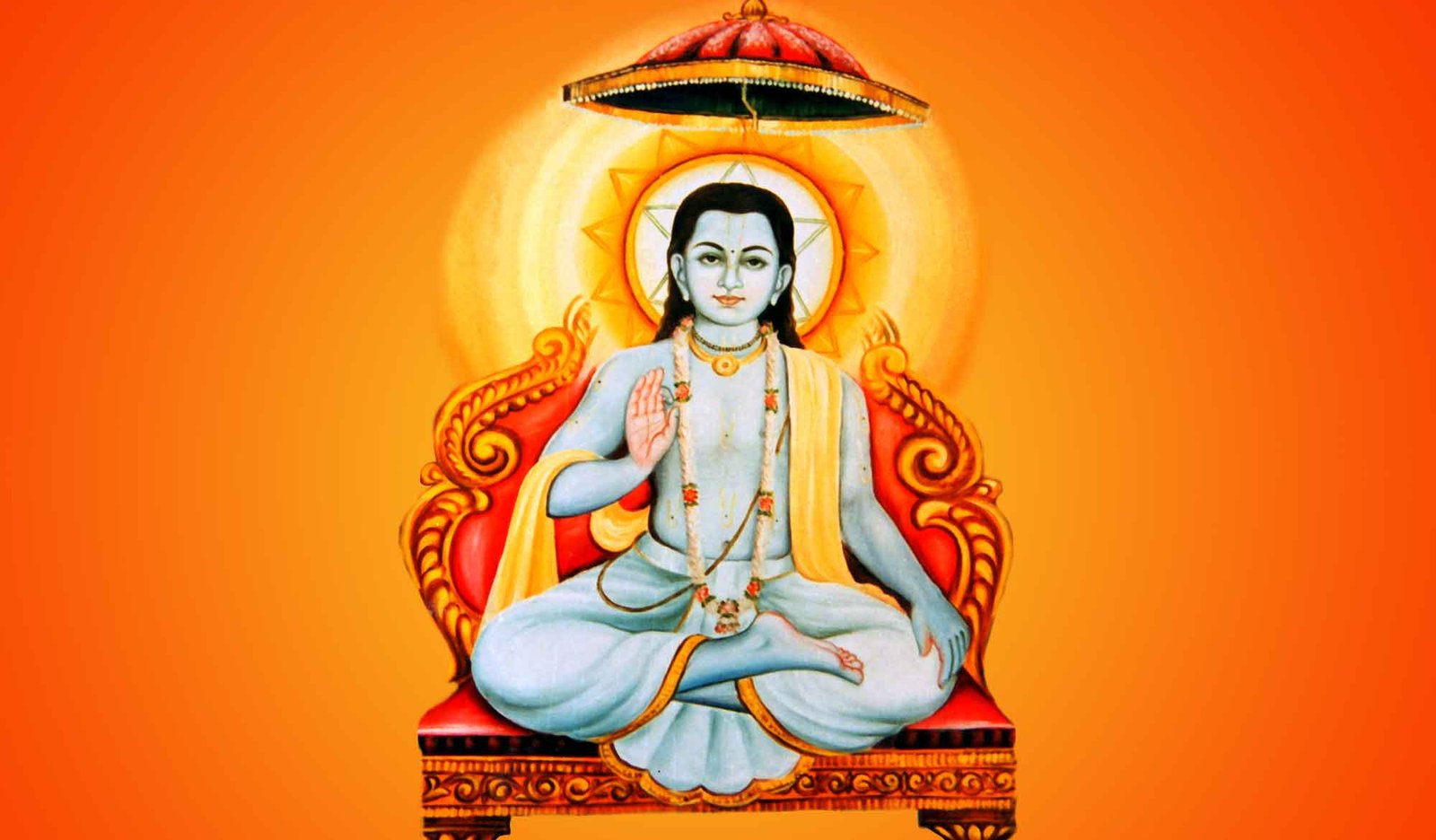
Nimbarkacharya’s contributions to Hindu philosophy, particularly through his Dvaitadvaita (dualistic non-dualism) doctrine, have left an enduring legacy. His emphasis on the simultaneous difference and non-difference between the soul, the universe, and God offers a unique perspective within Vedantic thought. By harmonising dualism and non-dualism, Nimbarka’s teachings provide a balanced approach to understanding the divine, emphasising both philosophical inquiry and devotional practice. The Nimbarka Sampradaya, with its focus on Radha-Krishna worship, continues to inspire devotion and spiritual growth among its followers. Shrinivasa’s sub-commentary, the Vedanta Kaustubha, further enriches this tradition by elucidating and expanding upon Nimbarka’s ideas. Together, these works have significantly influenced modern Hinduism, promoting a compassionate, inclusive, and devotion-centred approach to spirituality. Nimbarkacharya’s philosophy not only preserves the rich diversity of Hindu thought but also offers timeless wisdom that resonates with contemporary seekers. His legacy, rooted in both intellectual rigour and heartfelt devotion, continues to guide and inspire those on the path to spiritual enlightenment.


